Becoming green is a desirable idea, but it can also be intimidating. Do you have to entirely change how you grow your vegetables and only use organic fertilizers in order to have less of an impact on the environment? No, not always true. The good news is that you can make your garden greener by doing a lot of simple steps.
-
Top tips to keep your garden greener are as follows:
Plant as many trees as possible
Planting trees isn’t as difficult as you would imagine, because they provide habitat for wildlife and help clean the air. From digging the hole to caring for your young tree, this lesson will assist in guiding you through the procedure. Trees are said to be lungs for earth, hence, growing more trees is always an excellent choice.
Make your own compost pit
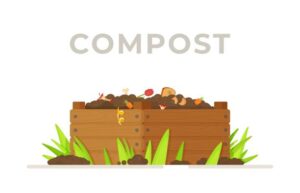 (Photo from istock)
(Photo from istock)
Kitchen leftovers are transformed into nutrient-rich nourishment for your soil through composting. Your plants will be content, and you’ll contribute less garbage to the dump. Instead of letting your vegetable waste get hauled off to the landfill, compost like a pro by adding it to the pile.
Compost, also referred to as “gardener’s gold,” improves soil fertility by injecting it with potent, plant-friendly nutrients. Rich, earthy compost enhances soil texture, aeration, and water retention in addition to promoting the growth of healthy roots.
Use methods as rainwater harvesting to make your garden greener
Saving rainwater is a terrific strategy to produce a greener garden while having a smaller environmental effect. A rain bucket is a DIY project that is also rather simple. Putting a rain barrel is an easy and inexpensive way to gather mineral- and chlorine-free water for cleaning and rinsing windows, watering gardens, lawns, and cars.
By utilizing the rain that is physically pouring from the sky, you’ll see a considerable reduction in water costs as well as a reduction in storm water runoff, which in turn helps prevent erosion and flooding. Insects, garbage, and bird missiles can be kept out by installing a screen over the barrel’s top. Water should be used frequently to maintain the barrel aerated and running.
Use a reel mower instead
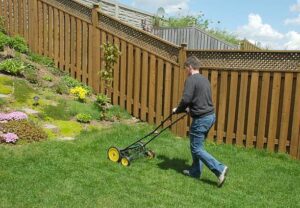 (Photo from istock)
(Photo from istock)
You can save money and lessen the quantity of toxic gases released into the atmosphere by switching to a non-gas powered reel mower. Also, it’s a great workout! Even if you only use the reel mower once every other time you mow, the ecology and air quality in your area will benefit.
Water carefully to make your garden greener
Give your garden a drink in the morning or afternoon when it’s the coldest so that more water may soak into the soil before it evaporates. Long-term water savings are achieved. Further advice for effective and environmentally responsible watering is provided in this post.
Since we’re talking about water, establishing a few wise watering practices will help you conserve it, especially during the summer’s dry and hot spells. Your soil will retain water and reduce evaporation if you add compost and mulch to it. Moreover, soaker hoses or drip irrigation only utilize 50 percent of the water used by sprinklers.
Reduce the grass in your garden
Easy-care ground cover plants, wildflowers, stone, pavers, and/or other materials can be used to create non-grass lawns. What will be the outcome? Less labour, less watering, and less mowing are required. Consider using moss as a ground cover and meadowing.
Try organic seeds
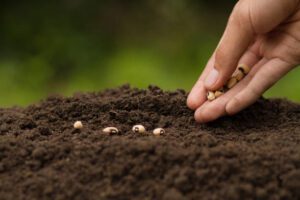 (Photo from istock)
(Photo from istock)
One easy method to get your garden off to an eco-friendly start is by planting organic seeds. Organic seeds are best to go to, as despite of their environment friendly attributes, they are also health enriching.
Use one fewer chemical-based product
If you typically use chemical fertilizers, insecticides, or herbicides, set a goal for yourself to switch to one of these techniques. See this post on using natural weed killers in the garden or this one on using natural alternatives to herbicides.
Go organic on a smaller scale
Get your feet wet by experimenting with organic gardening techniques in a container garden first if the thought of cultivating a complete organic garden seems like a bit too much to take on all at once.
Add on the bees and butterflies to make your garden greener
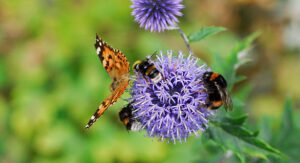 (Photo from istock)
(Photo from istock)
Grow a wide range of natural flowers that our pollinator friends like butterflies and bees, are especially drawn to, such wild lilac, goldenrod, and lemon balm, to give them a pesticide-free haven.
If you haven’t heard, a significant bee loss crisis is currently driving beekeepers in North America and Europe to shake their heads in concern. Extending a little neighbourhood hospitality could go a long way because pollinators impact 35 percent of global agricultural production and boost the productivity of 87 of the top food crops.
Buy Recycled
If the idea of utilizing yoghurt or takeout containers to house your hydrangeas offends your delicate aesthetic sensibilities, consider one of the many environmentally friendly planters and raised-garden kits that are now readily available.
Using recycled copper, plastic, or even rubber to support your tender shoots is acceptable because it consumes less energy than mining virgin materials. Relax on repurposed lawn chairs while admiring your craftsmanship and environmental prudence.
Keep it real for greener garden
You’ve heard the saying, “Mom knows best”? To keep her act together, Mother Nature never needed to sneak sips from a chemical cocktail of pesticides, weed killers, and chemical fertilizers. Put an organic compost layer down in place of the toxins. Bring in more helpful insects to wrestle annoying garden pests to the ground. When you can watch the action on the battlefield in real time, who needs to play Command & Conquer?

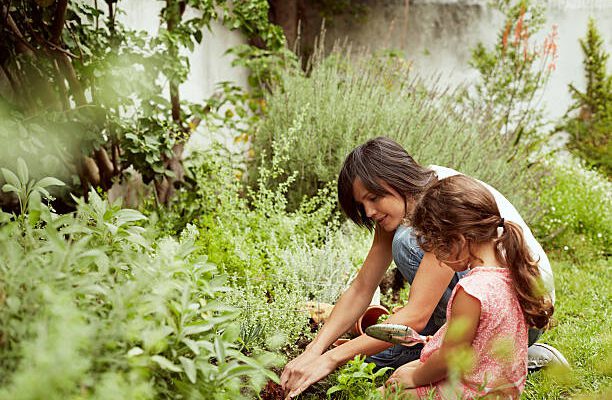

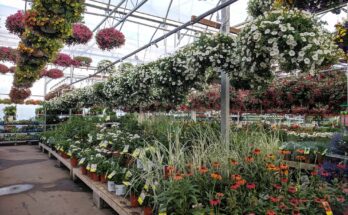
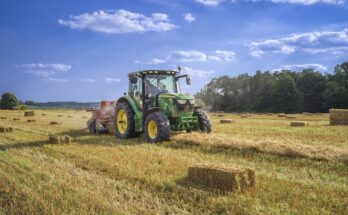
3 Comments on “How to make your garden greener”